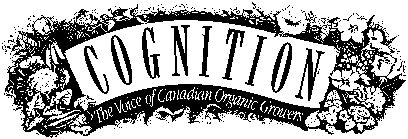

Cognition Index | Virtual Library
| Magazine Rack
Search
| Join the Ecological Solutions Roundtable
GLEANINGS
by Ann Cleary
In the November issue of Acres USA – A Voice for Eco-Agriculture, an interesting article on "Agriculture – the future is small" states: "Our food quality has deteriorated to a point where much of it is toxic. Much of our food is nutritionally valueless, unable to nurture our bodies, because it is grown in biologically disabled soil. Pollutants stress our water supplies. Ancient aquifers are drying up, and topsoil is disappearing. ....Abundant profitable crops are apparently a thing of the past.";
We know quite well that ecological agriculture, if practised globally, would eliminate many of these problems. But, and there always is a but, how can one small voice be heard and our system followed? What stands in the way?
You only have to read The Packer, a weekly U.S. newspaper ("For 102 years the Business Newspaper of the Produce Industry") to appreciate the tremendous forces ranged against us. Industrialized farming has taken little account of the environment except as something to be manipulated and conquered by the "business" of agriculture. Small businesses are soon swallowed up into large multinational corporations – seed companies are a case in point – and large produce companies merge as do wholesalers and retailers in the agricultural trade.
Organic agriculture is a small part of agriculture. We would have more clout if we all banded together, for our principles are the same whether we call it ecological agriculture, bio-dynamic farming, permaculture, regenerative agriculture, or the more generally termed "organic" agriculture. We all have different roots involving the methods and experience of the past with suitable technology from the present to produce food of high nutritional quality without added chemicals for future needs.
A Canadian writer who has explored the intricacies of food production is Brewster Kneen. He is author of several books, all of which form a composite picture of the magnitude of operation of agri-business corporations. His latest book is The Invisible Giant - Cargill – and its Transnational Strategies. Cargill is the largest private corporation in North America, trading in all agricultural commodities and processing some of them. Kneen explains clearly what transnational corporations do as well as their philosophies and practices, using Cargill as the focus of his study. Cargill is wealthy, influential and almost unknown to the general public, as are many other giant corporations. Kneen’s books should be on the curriculum of every agriculture student, as should his periodical The Ram’s Horn, which gives an up-to-date running commentary on food production in all its aspects.
Environment Canada and Agriculture & Agri-Food Canada hold workshops on policy issues, including sustainable agriculture and food labelling of genetically engineered products which I and other COG members have attended. Although our views are fully discussed at these sessions, the organic system never seems to find its way into final task force reports with anything much more than a lukewarm nod. While genetic engineering seems to be more and more considered as necessary to future food production, labelling of genetically engineered food seems a lost cause. Meanwhile, conferences, workshops and lectures at a very high governmental level continue to be held all over the country, at fees that few individuals or small organizations such as COG can afford. The "softening up" of opposition to biotechnology continues apace.
Perhaps our best recourse is market our produce at farmers’ markets and health food stores and form co-ops and community shared agriculture, sell direct to hotels and restaurants, and above all set up organic food markets. There seems to be a slow but steady growth in demand for organic products. We do, however, need to avoid the special niche marketing for the rich elite. The organic movement was founded on providing nutritional food for "the people" without the use of chemicals and by methods tested and tried over centuries, and by adapting modern technology to our methods. Sustainability is certainly at the very heart of our agriculture, and good uneroded soil at its base.
Agriculture and Agri-Food Canada has recently published a study, The Health of Our Soils – Toward Sustainable Agriculture in Canada. It discusses conservation and nurturing of good soil and, in its summary, states: "New agricultural policy for soil conservation is needed, aimed at achieving sustainable agriculture and built on the understanding that agro-ecosystems are part of the broader environment."
REFERENCES:
The Ram’s Horn. Published quarterly by Brewster and Cathleen Kneen, Box 3028, Mission, B.C. V2V 4J3.
The Invisible Giant - Cargill – and its Transnational Strategies. Brewster Kneen, Fernwood Publishing, Halifax, N.S., 1995, 232 pp.
Workshop on Agriculture & Environment – Towards Sustainable Agriculture, March 24-28, 1995, Ottawa. National Agriculture Environment Committee, 75 Albert St., Suite 1101, Ottawa, ON K1P 5E7.
The Health of Our Soils – Toward Sustainable Agriculture in Canada. Agriculture & Agri-Food Canada, The Centre for Biological Research, Room 87, H.K. Neatby Bldg., 960 Carling Ave., Ottawa, ON K1A 0C6. $15 + GST (new publication).
Copyright © 1996.
Ann Clearyby author.
Reprinted with permission. All rights reserved.
Info Request | Services | Become EAP Member | Site Map
Give us your comments about the EAP site
Ecological Agriculture Projects, McGill University (Macdonald
Campus)
Ste-Anne-de-Bellevue, QC, H9X 3V9 Canada
Telephone:
(514)-398-7771
Fax:
(514)-398-7621
Email: info@eap.mcgill.ca
To report problems or otherwise comment on the structure of this site, send mail to the Webmaster